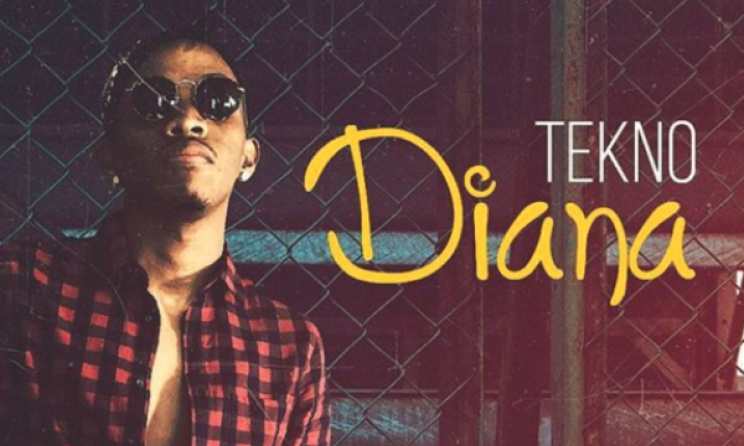Tekno — Diana
 Tekno returns with new single 'Diana'
Tekno returns with new single 'Diana'
As long as single words can be song titles, there will always be a Tekno hit. ‘Holiday’, ‘Dance’, ‘Wash’, ‘Duro’, ‘Anything’, Where’, and now ‘Diana’.
If the paragraph above looks familiar, it is because you have read it before in slightly different form. Those were the words I used in a review of ‘Pana’, Tekno’s previous single. Like Tekno, I am not against using and reusing a formula. But I admit that he’s better at it.
But what exactly is the Tekno Formula? Easy. Mix these: single-word title, funny/silly love lines, goofy dance, propulsive drum-based beat, simple singalong chorus, killer hook—all wrapped in a mild Igbo accent. Better not try at home. It could be explosive.
The new song ‘Diana’ once again has the self-proclaimed Alhaji Tekno as male protagonist and a female lead, this time named Diana. As always, the girl has nothing but a name; Tekno hardly gives his women anything but a name. Unlike some of his colleagues he names his women: Nneka, Chioma, Folake, Aisha etc. Unlike them he doesn’t furnish his women with too much by way of physical dimensions. His method raises a question about Nigerian pop. What is better? The reduction of a woman to her parts—backside and breasts, mostly—or her total absence except for generic, interchangeable names?
Tricky one perhaps, but we can agree that both are means of objectification. Nigerian music is a long way from featuring women who had both name and a presence somewhat outside of lust in songs (and videos) like ‘Lade’ or ‘I No Dey Shame’ by Djinee, or dedicated to strong female characters like the unnamed woman in Fela’s ‘Lady’.
These thoughts don’t bother artists like Tekno. It is not his business; he just wants you to have a good time. And if his risible lyrics don’t get you, his beats will. Tekno is a stand-up comedian with melodic gift and great production. Let’s call him a sing-up comedian..
His humour is a great gift, but it may also prove to be a restricting gift. How so? Well because some of the best humour is local and structured for particular cultures, and thus may not translate to other cultures readily. So that if Tekno is a two-trick pony, in terms of humour and melody, persons outside of West Africa may receive only half his tricks. Clearly, this is the fate of any pop artist who finds himself outside of his own culture, but it seems to me that humour, which is a great asset, can prove a handicap outside of its own milieu.
A love song is a love song anywhere—Nigerian kids were mouthing lyrics to Celine Dion and Boys II Men long before knew what those words meant. A dance song is a dance song everywhere and across Africa people danced and to the songs of Awilo Longomba. A funny song is not a funny song everywhere. With Tekno’s ‘Diana’, you need some familiarity with nigerian pidgin to appreciate these lines:
Make dem fire catapult o Makey dem takey me court o… I must to run your race oo, ehDance to your drum and bass oo, eh
My love is up to date o
It would be unnecessary to have this discussion about the global potential of Tekno’s music, but this is 2016—a year in which there’s quite the push for Nigerian pop music to acquire some sort of global mainstream presence. Tekno’s appeal is wedged to Nigeria, and unless something changes, he’s likely not going to be at the front of the breakthrough. Already Davido and Wizkid have been chosen as the Nigerian representatives for this push into the US market, which because of its dominance stands as the global pop marketplace.
Davido has always courted the US; he was born there in any case. Wizkid is the true homegrown avatar, and because his own appeal is essentially his chameleonic gift of spinning melodies, he doesn’t have Tekno’s baggage. With Wizkid, what Nigerians appreciate is exactly what people from elsewhere have and will come to appreciate. With Tekno, the foreign audience will receive half of the Great Tekno Package.
Tekno, however, has production protection from both his team and from his time as producer. So he might always be able to make the listener dance. He does pull it off on ‘Diana,’ which is produced by two of the producers with whom he has pop chemistry: Selebobo and Krizbeats. The latter worked on the all-conquering ‘Pana’. ‘Diana’ isn’t quite as grand as that tune, but this, too, will become a tune on the lips of most pop lovers. Songs for girls and about girls remain potent. And this one recalls another song about girls: 2006’s ‘Tattoo Girls’ by Faze.
Like that song, ‘Diana’ mentions girls of several nationalities at the end. Tanzanian, Ghanaian, Cameroonian, Kenyan, European and so on. But Tekno is more after their country/continent’s market than the women. He wants to be able to say these things while performing in those foreign places.
It may be some consolation that so far Tekno doesn’t exactly need the foreign market, not now at least. He has toured Europe. He has hits across Africa, and has won a MAMA award. He has his whole country dancing. The man may know his formula won’t work forever and maybe not as widely as he’d like—but Alhaji Tekno can worry about all of that later.

























Commentaires
s'identifier or register to post comments